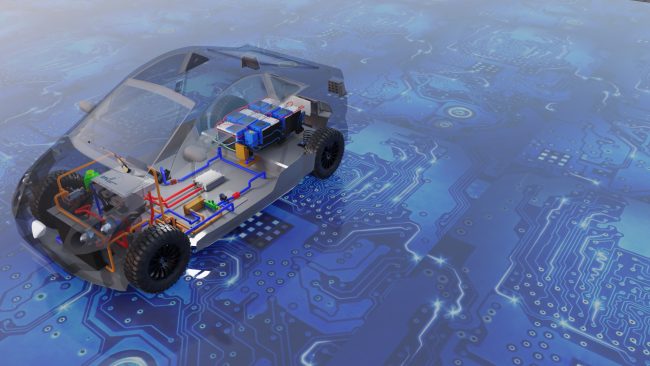
A multidisciplinary team of researchers, led by Alumni Distinguished Professor Cristina Amon (MIE), has been awarded an NSERC Collaborative Research and Training Experience (CREATE) grant to accelerate training and research into extending electric vehicle (EV) performance and lifetime of battery systems by improving the way they manage cold and hot temperatures.
The NSERC CREATE in Thermal Management of Electrification Technologies (TherMET) project will be directed from U of T’s Electrification Hub — a research hub seeded by the Dean’s Strategic Fund in 2020. The team includes 10 professors from three Ontario universities at the centre of Canada’s automotive corridor — U of T, Ontario Tech University and the University of Windsor — as well as 21 collaborators from government, Indigenous communities, academia and industry, including companies such as Ford Canada, Tesla, Lion Electric, eCAMION, Covestro and Flex-N-Gate. This multidisciplinary team includes Professors Sanjeev Chandra (MIE), Alison Olechowski (MIE) and Mohini Sain (MIE) as well as MIE alumnus and Ontario Tech professor Marc Rosen.
Providing $1.65 million of funding from NSERC, this is the only CREATE grant awarded to U of T in this round, and the first in three years. TherMET’s pioneering training program is strategic for U of T, which will invest, together with Ontario Tech University and University of Windsor, an additional $2 million in management and students’ support over the CREATE’s six-year grant. This significant investment will leverage several other EV-related emerging initiatives at U of T, including new curricula, research and teaching labs, and technology hubs.
Last year, EVs made up more than 5% of new vehicle registrations in Canada for the first time, and the recent Canadian federal budget calls for that proportion to grow to 60% by 2030. At the same time, large stationary battery packs are increasingly being deployed as backup power solutions for homes and businesses, as storage for renewable solar and wind energy, and as components of off-grid generation systems.
These shifts are rapidly increasing demand for highly qualified personnel with strong technical expertise in all aspects of batteries and related technologies, from component design to manufacturing, integration and testing. They will also need an ability to work across disciplines to address complex challenges in a range of domains.
One of the key challenges is thermal management. High temperatures are detrimental to lithium-ion batteries, impacting their charging speeds, expected lifetime and overall safety, as well as the driving range of the EVs that contain them.
But extremely low temperatures, such as those encountered during a typical Canadian winter, are also a challenge. The TherMET program will establish innovative and sustainable training programs in advanced thermal management of core electrification technologies for both extremely hot and cold climates.
“Thermally dependent core electrification technologies still require transformative developments in battery packs, chargers, electric motors and thermal management strategies to improve their reliability, performance and safety,” says Dr. Carlos Da Silva, Electrification Hub Executive Director.
“Our program aims to meet these challenges by establishing a pioneering and sustainable training program within a holistic component-to-system training scope. We will train and mentor Canada’s future leaders on core electrification technologies leading to thermally safer, lighter, more durable and environmentally friendly batteries and EVs,” says Amon.
TherMET is organized under three research pillars, with 12 training components:
- Core EV sub-systems for thermal management of battery packs, onboard EV electronics and electric motors
- EV system and integration technologies for intelligent EV thermal management strategies tolerant to extreme cold and hot climates
- Stationary battery application and repurposing to create resilient energy storage solutions for Canada’s urban and northern populations
The interdisciplinary focus of the program will allow trainees from engineering disciplines, social sciences and public health to work together to promote awareness of the environmental and social consequences of implementing electrification technologies in urban and rural settings.
One of the training components is focused on knowledge translation with northern and Indigenous communities to examine the community, technical, environmental and social implications of deploying stationary battery systems in extreme cold climates, as well as their thermal management needs.
“Remote, northern communities face particular challenges with energy systems including cold weather, changing climate, limited infrastructure and transportation options. These factors, along with small population and vast geographical distances, make the transition to renewable energy challenging but not impossible. Stationary battery systems are key to improving penetration of renewables in many northern and Indigenous communities piloting solar- and wind-powered energy systems. Our trainees will have unprecedented opportunities to visit northern renewable energy projects and learn from northern and Indigenous partners leading these initiatives including Yukon University, Yukon Solar Corporation, the Municipality of Sioux Lookout, and the Sioux Lookout Friendship Accord Corporation,” says Professor Tracey Galloway (Anthropology UTM), a co-investigator in this project.
“Our CREATE program will nurture the next generation of professionals and leaders to instill the talent and skills needed to advance thermal management innovations suitable for extreme cold and hot climates, and to act on the environmental and social issues affecting these core electrification technologies,” says Amon.
– This story was originally published on the University of Toronto’s Faculty of Applied Science and Engineering News Site on June 9, 2022 by Safa Jinje